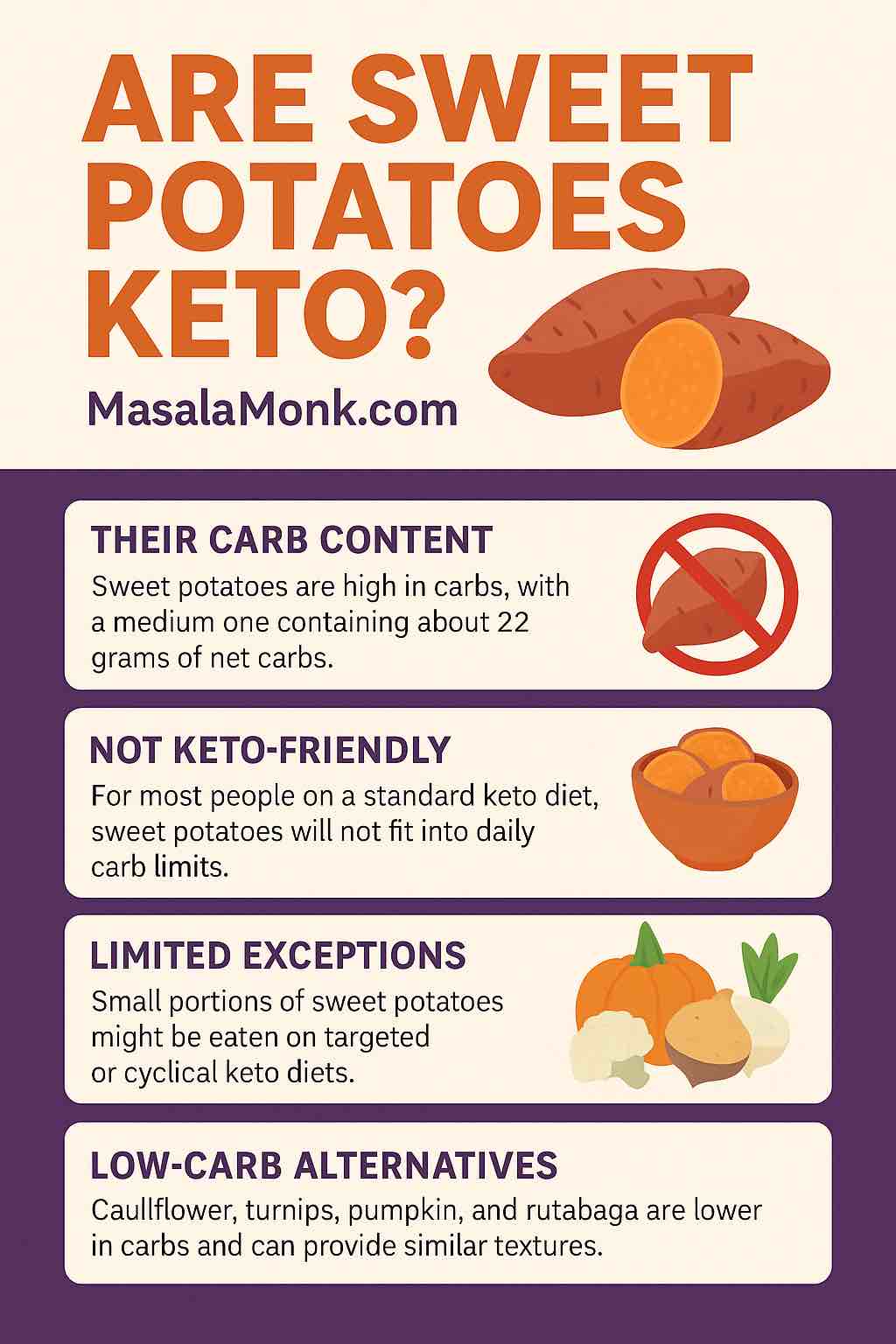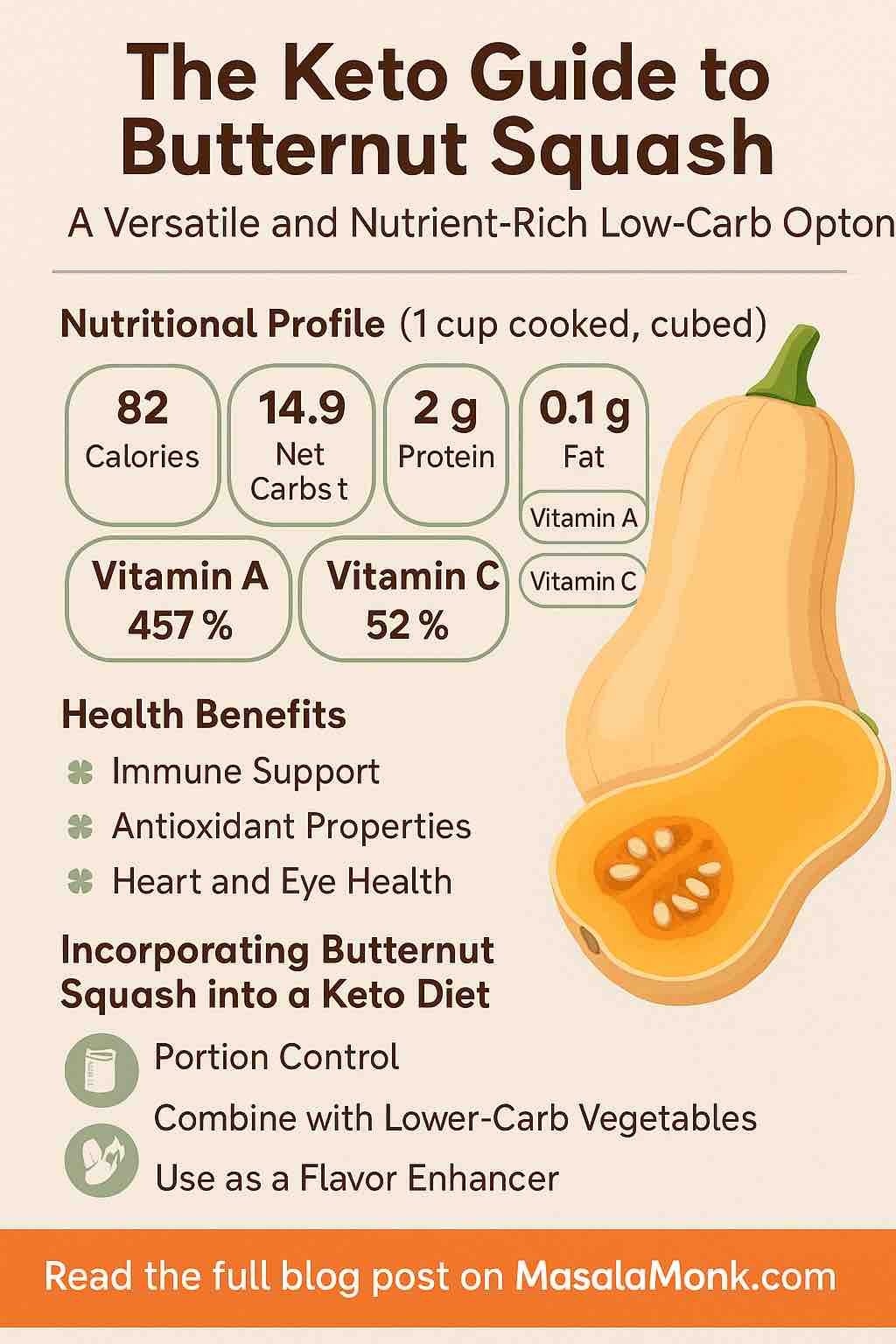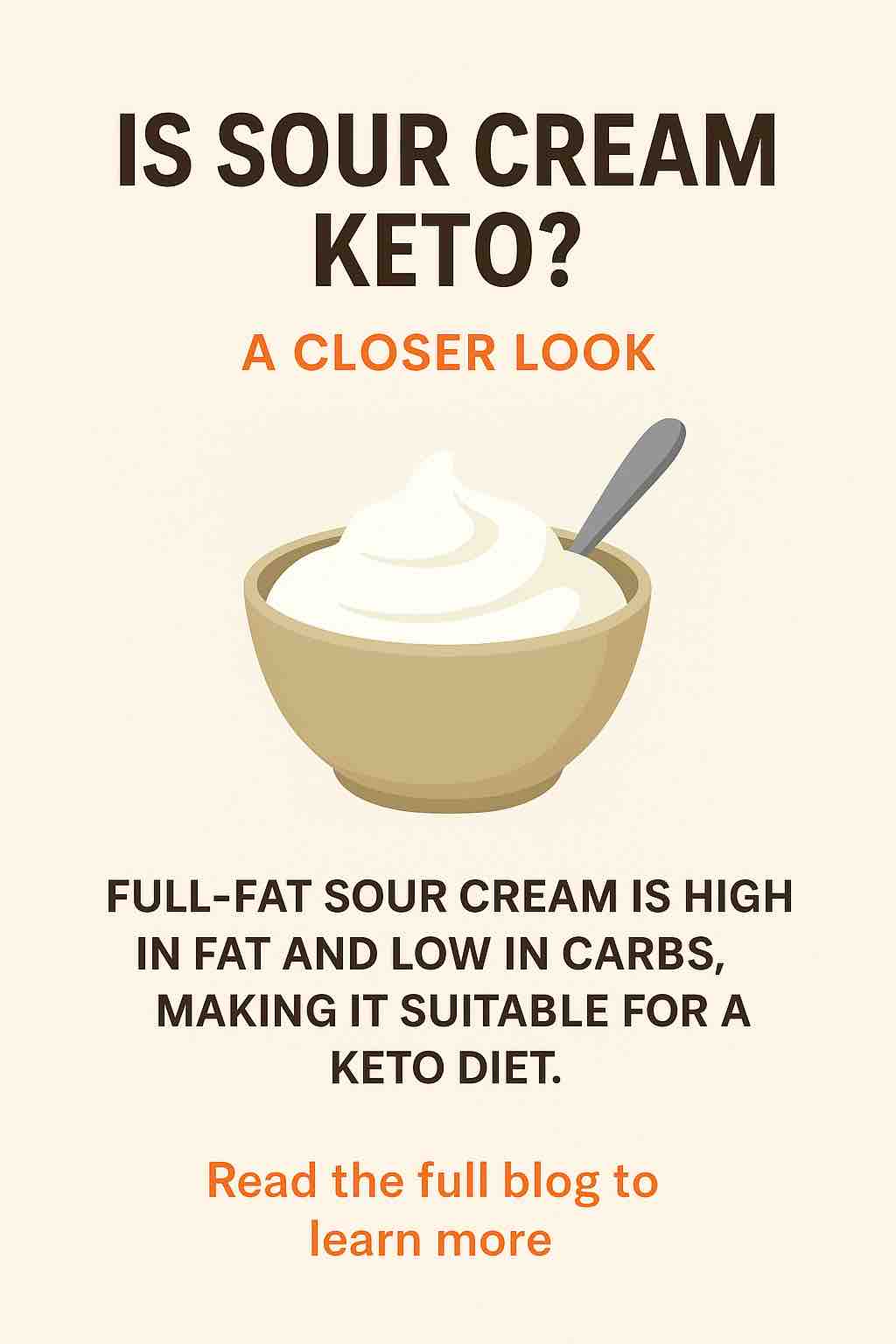
Sweet potatoes are often hailed as a “superfood” — nutrient-rich, delicious, and versatile. But if you’re on a keto diet, you might be wondering: Are sweet potatoes keto-friendly? Can you eat sweet potatoes on keto? The short answer is no — but there’s nuance worth exploring.
In this post, we’ll unpack the sweet potato’s carb profile, discuss its compatibility with various types of keto diets, suggest low-carb alternatives, and offer practical tips for managing cravings without compromising ketosis.
🧠 What Is the Keto Diet, and Why Does It Limit Carbs?
The ketogenic diet is a high-fat, very low-carb, moderate-protein eating plan that aims to shift your body’s metabolism from relying on glucose (carbs) to burning fat for fuel, a metabolic state known as ketosis.
To reach and maintain ketosis, most people aim for 20–50 grams of net carbs per day. That’s where the conflict begins with sweet potatoes.
🥔 How Many Carbs Are in a Sweet Potato?
Sweet potatoes may seem healthy—and they are, in many diets—but they pack a lot of carbohydrates, which is problematic for keto.
Here’s the breakdown for 1 medium sweet potato (~150g):
- Total Carbohydrates: ~26g
- Fiber: ~4g
- Net Carbs: ~22g
That’s nearly an entire day’s worth of carbs in one serving — and that’s assuming you’re on the higher end of the keto carb limit.
❌ Are Sweet Potatoes Keto-Friendly?
For most keto dieters, sweet potatoes are not keto-friendly. The high net carb count means that even a small portion could kick you out of ketosis.
That said, there are scenarios where sweet potatoes might be integrated into a broader keto strategy — but only for experienced dieters using specific keto variations.
🔁 When Can You Eat Sweet Potatoes on Keto?
Sweet potatoes don’t fit well into standard ketogenic diets, but they may work in the context of:
1. Targeted Ketogenic Diet (TKD)
This approach is used by athletes or active individuals who consume extra carbs around their workouts. In this case, a small portion of sweet potato pre- or post-workout can provide energy without long-term disruption to ketosis.
2. Cyclical Ketogenic Diet (CKD)
This strategy includes higher-carb “refeed” days, often once or twice a week. Sweet potatoes are an excellent option during these phases, offering complex carbs and nutrients to replenish glycogen stores.
3. Carb Cycling or Relaxed Keto
If you’re doing a lazy or low-carb diet that’s not strictly keto, sweet potatoes may be workable in small, carefully measured portions.
However, if you’re following a traditional or therapeutic keto plan (e.g., for epilepsy or insulin resistance), sweet potatoes are likely off-limits.
🥦 Low-Carb Substitutes for Sweet Potatoes on Keto
Craving the hearty, sweet, starchy flavor of a sweet potato without the carb overload? Here are some keto-approved alternatives that scratch the same itch:
1. Cauliflower
Low in carbs (2g net carbs per 100g), cauliflower is a keto MVP. You can mash it, roast it, rice it — and when seasoned right, it’s a fantastic base for savory dishes.
2. Turnips
With ~4.6g net carbs per 100g, turnips have a mildly sweet flavor and potato-like texture when roasted or mashed.
3. Rutabaga
A slightly sweet and dense root vegetable, rutabaga has about 7g net carbs per 100g and works great roasted or spiralized.
4. Pumpkin
With ~5g net carbs per 100g, pumpkin can be used in both sweet and savory recipes. It’s especially useful for soups, mash, or pies.
5. Jicama
Crunchy, slightly sweet, and only ~4.5g net carbs per 100g, jicama is great raw, sautéed, or air-fried.
These alternatives give you the mouthfeel and flavors you may miss without sabotaging your ketosis.
🥦 Best Low-Carb Substitutes for Sweet Potatoes
Craving that sweet, starchy texture? Try these keto-friendly swaps:
| Substitute | Net Carbs (per 100g) | Why It Works |
|---|---|---|
| Cauliflower | 2g | Versatile, great mashed or riced |
| Turnips | 4.6g | Slightly sweet and roastable |
| Pumpkin | 5g | Subtle sweetness, great in soups |
| Rutabaga | 7g | Excellent roasted or mashed |
| Jicama | 4.5g | Crunchy, low-carb fry option |
🔥 The Nutritional Case for Sweet Potatoes (When Not on Keto)
Although they’re not keto-friendly, sweet potatoes are far from unhealthy. They’re a rich source of:
- Beta-carotene (a precursor to Vitamin A)
- Potassium
- Manganese
- Vitamin C and B6
- Dietary fiber
They support gut health, stabilize blood sugar in moderate diets, and provide slow-digesting carbs ideal for non-keto lifestyles or post-workout meals. If you ever transition off keto, sweet potatoes are one of the best complex carbs to reintroduce.
🍽️ Tips for Handling Sweet Potato Cravings on Keto
If you’ve been keto for a while, you may still miss the taste and texture of sweet potatoes. Here are a few tricks to keep your cravings in check:
- Recreate the flavor profile using spices like cinnamon, nutmeg, and smoked paprika with low-carb veggies like pumpkin or rutabaga.
- Make a mock sweet potato mash using cauliflower or pumpkin with butter, cream cheese, and seasonings.
- Use keto-friendly sweeteners like erythritol or allulose in casseroles or sides to get that sweet-savory balance.
Remember, the psychological side of keto is just as important as the metabolic one. Finding satisfying swaps can make a big difference in long-term success.
🧾 Final Word: Sweet Potato and Keto Diet—Are They Compatible?
While sweet potatoes are a whole, nutrient-rich food, they don’t align with the macronutrient structure of a ketogenic diet. They’re simply too high in carbs for regular consumption on strict keto. However, context matters.
- On TKD or CKD, you may fit in small servings occasionally.
- If you’re on low-carb but not ketogenic, you have more flexibility.
- For strict keto dieters, opt for the many delicious and creative substitutes available.
Sweet potatoes are off the keto menu — but the flavors and textures you love don’t have to be.
✅ 10 Highly Relevant FAQs for the Blog Post
These FAQs are crafted to capture featured snippets and directly answer high-intent keyword questions from your list.
1. Are sweet potatoes keto-friendly?
No, sweet potatoes are not keto-friendly due to their high carbohydrate content. A medium sweet potato contains about 22 grams of net carbs, which can exceed the daily limit on a standard ketogenic diet.
2. Can you eat sweet potatoes on a keto diet?
Only in very limited circumstances. Sweet potatoes may be consumed in small portions on targeted or cyclical ketogenic diets, but they are not suitable for strict keto.
3. Is sweet potato keto approved?
Sweet potatoes are not typically approved on keto diets. Their carb content is too high to maintain ketosis unless you’re on a modified version of keto.
4. Are sweet potatoes considered low carb?
No. While healthier than white potatoes, sweet potatoes are not considered low-carb. A single serving can easily exceed daily carb limits for low-carb or keto diets.
5. How many carbs are in a sweet potato?
A medium sweet potato (~150g) contains approximately 26g of total carbs, 4g of fiber, and about 22g of net carbs.
6. What happens if you eat sweet potatoes on keto?
Eating sweet potatoes on a strict keto diet may raise blood sugar and insulin levels, kicking you out of ketosis and halting fat-burning.
7. Can sweet potatoes be eaten in a targeted keto diet?
Yes, small amounts of sweet potato can be used around workouts in a targeted ketogenic diet (TKD) to provide short-term energy without fully disrupting ketosis.
8. What are keto-friendly alternatives to sweet potatoes?
Great low-carb substitutes include cauliflower, turnips, rutabaga, pumpkin, and jicama—all offering fewer net carbs and similar textures.
9. Are there keto recipes that mimic sweet potato dishes?
Yes. You can recreate sweet potato casseroles or mashed sweet potatoes using ingredients like pumpkin, cauliflower, or rutabaga, combined with spices and low-carb sweeteners.
10. Why do people think sweet potatoes are healthy if they’re not keto?
Sweet potatoes are healthy in general—they’re rich in fiber, vitamins, and antioxidants—but their high carb content makes them unsuitable for ketogenic diets.











